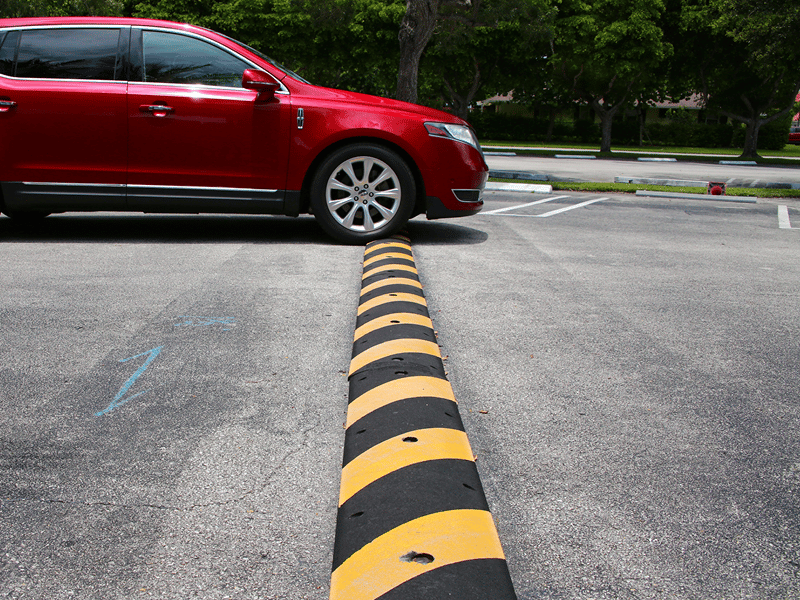

While speed humps are devices that all Australian drivers encounter multiple times a week, not so many know how these traffic calming products actually work.
As drivers, one of the first laws that we become familiar with is the speed limit. We know that every road has a speed we can go, and that going over a speed limit and getting caught can result in hefty fines and even jail time. Despite these types of deterrents, many people tend to forget that speed limits are in place for a reason.
According to research conducted by insurance provider Budget Direct, the chance of a reasonably fit adult surviving being hit by a car driving at fifty kilometres per hour is only 10%. What’s worth noting though, is that the survival rate increases as the car’s speed decreases, with that figure lifting to 90% should the car be driving at thirty kilometres per hour.
However, for children, the elderly and people with disabilities, those figures might as well be thrown out the window. Speed is one of the biggest killers in Australia, which is why essential traffic calming measures like speed humps are commonly deployed throughout the nation as a means to reduce it – but how do they actually work?
As a preventative road safety tool, speed humps are parabolic vertical traffic calming devices intended to slow traffic speeds to create a safer environment. While materials such as asphalt, plastic and steel are often used, rubber speed humps are regarded as the most durable and inflict the least amount of damage to cars, they can even be sound absorbing making them perfect for residential estates, retirement villages and hospitals.
In Australia, speed humps are used in a wide variety of settings, as their size, materials and function offers a flexible approach to road safety. In addition, a speed hump covers a longer section of road, sometimes as much as a full wheel rotation, making a speed hump a less aggressive obstacle for cars when compared to a speed bump.
While speed humps permit faster travel, they will still discourage excessive speed, as a driver is essentially forced to slow down in order to avoid damaging their car. In addition to their ability to physically slow cars down, the distinctive black and yellow paint used on speed humps also act as a visual aid, improving their function as a road safety measure.
However, speed hump installation techniques vary depending upon the dimensions of the hump and the material it is made from. The objective of the speed hump is to gradually lower the speed of traffic to reduce the chances and severity of injury to pedestrians. This has to be done without causing damage to cars, and the humps have to be gentle enough to ensure that emergency vehicles are not impeded.
When considering the basic design and function of speed humps, warning signs should be used to notify approaching motorists of upcoming humps. Speed humps also generally have pavement markings to enhance visibility and a taper edge near the curb to allow a gap for drainage, but will lose their benefits if not properly maintained or replaced in a timely manner.
In addition, poorly designed speed humps that are too tall or with too sharp an angle can be considered too disruptive for drivers, and may be difficult to navigate for vehicles with low ground clearance, even at very low speeds. Many sports cars have difficulty navigating lower speed bumps even when approaching them at a lower speed, and these devices can also pose serious hazards to motorcyclists and bicycle users if they are not clearly visible.
Needless to say, it’s worth noting that not all speed humps were created equally, so it’s important to do your research in order to get the right fit for your workplace or business. If you’re not quite sure where to start, it’s a good idea to partner with the experts – but where do you find them?
At Speed Humps Australia, we’ve spent twenty years focusing on one thing: to provide one style of product, and to do it exceptionally well. We have worked tirelessly to develop specifications that do not fade or deteriorate, are easy to install, and are made from high-quality, recycled rubber for minimal environmental impact.
With just a handful of our clients around the nation including KFC, Taco Bell, McDonalds and numerous local governments and mining operations, our rumble bars, speed humps and wheel stops have been purposefully designed to truly go the distance.
As our design and production is all handled in house and supplied Australia wide, get in touch with us today to request a quote or discuss how we can help with providing a tailored solution to your unique project requirements.



For 10 years, our focus has been on one thing: to provide one style of product and to do it well.
Our wheel stops, speed humps and rumble bars meet Australian Standards, don’t fade, and we’ve never needed to replace one.

For 10 years, our focus has been on one thing: to provide one style of product and to do it well.
Our wheel stops, speed humps and rumble bars meet Australian Standards, don’t fade, and we’ve never needed to replace one.